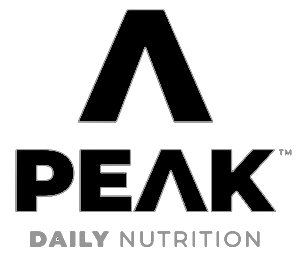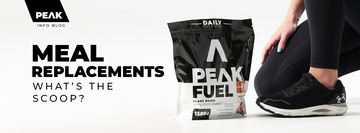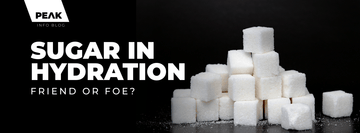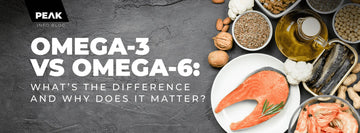In our fast-paced world, convenience is a priority.
Whether you're managing a hectic schedule, trying to lose weight, or simply need a reliable meal replacement, shakes have grown in popularity. But not all shakes are created equal…
Meal replacement vs. Protein supplement: What’s the difference?
Both powdered products differ in their purpose and nutritional composition:
-
Protein Supplements
Protein supplements are designed to boost protein intake, typically containing 18–25g of protein per serving with minimal carbs, fats, and fiber. For example, the protein content in PEAK Protein is equivalent to 75g of protein, 3 large eggs, or 100g of chickpeas. This product is ideal for post-workout recovery, muscle maintenance, or supplementing low-protein diets.
Protein supports lean body mass, promotes satiety, and helps reduce post-meal hunger. -
Meal Replacements
Meal replacements are formulated to provide the essential nutrients found in a typical balanced meal. They typically contain a blend of macronutrients — protein, carbohydrates, fats, and fiber — along with vitamins and minerals, aiming to nourish the body more comprehensively.
The PEAK FUEL Meal Replacement contains double the protein of PEAK Protein, with the carbohydrate and fat equivalent of 100g of rice and 30g of nuts. This meal replacement boasts one of the highest protein-to-carb ratios on the market, making it an excellent choice as a busy-day backup.
Benefits of using a meal replacement
Meal replacements can offer several advantages when used appropriately:
-
Time Efficient: Perfect for those who struggle to prepare or access balanced meals during the day.
-
Convenient: Eliminate the need for shopping, prepping, cooking, and cleaning; travel-friendly.
-
Portion Control: Offers a defined calorie content and macronutrient distribution, improving portion control and weight management.
-
Balanced Nutrition: A well-formulated meal replacement can provide essential nutrients that might be lacking in convenience options.
-
Support Specific Goals: Whether your goal is weight loss, muscle recovery, maintenance, or managing blood sugar, the PEAK FUEL Meal Replacement is tailored to meet your nutritional needs.
-
Satiety: A meal replacement needs to keep you full and provide sustained energy throughout the day. Controlling blood sugar levels is easier when your fiber goals are met. A "high fiber" product needs to meet the criteria of 6g of fiber per 100g. PEAK FUEL product contains 9.7g of fiber per 100g (or 9g of fiber per serving). This not only helps improve blood sugar levels and satiety but can also enhance cholesterol levels.
Meal replacements can be a smart, nutritious choice when life gets hectic. When chosen wisely, they can bridge gaps in your diet, simplify your routine, and support your health goals.
Reference
Dunford, M. & Doyle, J.A. (2019). Nutrition for Sport & Exercise (4th Edition).













